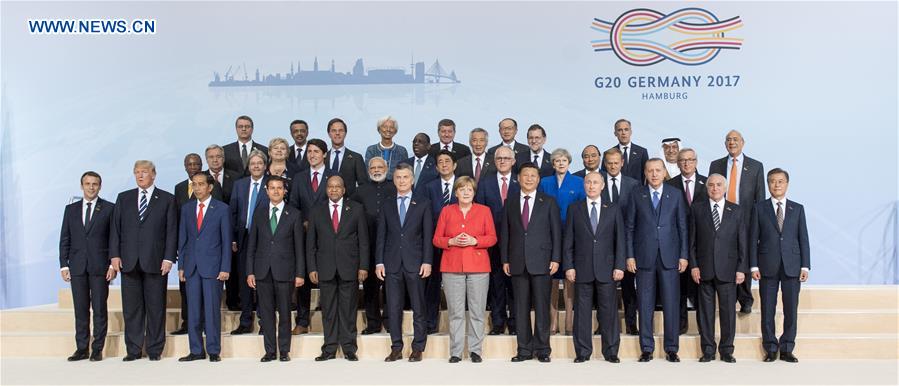


Chinese President Xi Jinping and other leaders attending the 12th Summit of the Group of 20 (G20) major economies pose for a group photo in Hamburg, Germany, July 7, 2017. (Xinhua/Li Xueren)
The consensus reached at the just-concluded Group of 20 (G20) major economies on support for globalization highlights multilateral cooperation as a major trend in global governance that meets people's needs.
Meanwhile, experts said China is playing an increasingly important role in global governance, bringing up new ideas and initiatives.
Leaders at the G20 summit themed "Shaping an Interconnected World" held on July 7-8 in the German city of Hamburg pledged support for continued globalization with a call for opening markets and opposing protectionism. They also agreed to work towards a stable international trading system and more cross-border investments.
The G20 summit consensus conforms to the new circumstances of the global economy, which is now marked by both interdependence and instability, according to experts.
Dennis J. Snower, co-chairman of Think 20, a think tank for the G20, believes such a global economy calls for multilateral solutions.
The global economy is "basically and completely integrated," so the problems generated are also interdependent, such as climate change, the financial crisis, cyber security and terrorism, he said.
"These problems cross national boundaries and can only be solved multilaterally," said Snower, who is also president of the Kiel Institute for the World Economy.
Dirk Messner, co-chairman of Think 20, noticed the dramatic changes over the last three years are posing new challenges to the G20 group.
Messner, also director of the German Development Institute, cited Britain's exit from the European Union and U.S. President Donald Trump's protectionist "America First" policies and withdrawal from the Paris Climate Agreement as being among the major events to put globalization and multilateralism at risk.
He said the year 2016 was "a shock" and "very difficult for multilateralism" due to Trump, after the Paris climate deal was reached and the United Nations (UN) Sustainable Development Agenda for 2030 signed in 2015.
However, the political and economic instabilities indicate the changing needs of the people, he added.
Global governance "should above all answer to men's needs," which go beyond material prosperity to social ones such as the need for life satisfaction and security, he noted.
Messner believes that as a premier forum on international cooperation and global governance, the G20 group should address more major concerns of people in global development, such as climate change and the widening gap between rich and poor, helping shape a peaceful and hopeful future for the world.
Regarding global governance to meet the new changes, the importance of China is increasing in many aspects, Messner said.
China was regarded as a powerful spokesman for global multilateralism at the Hamburg summit, said Shada Islam, policy director of Friends of Europe, a leading Brussels-based think tank.
At the summit, Chinese President Xi Jinping delivered an important speech with proposals made urging efforts to continue opening-up and inclusiveness as well as to push for interconnectivity and growth.
Shi Shiwei, professor with the Free University of Berlin, said, "Xi's speech represents the stance of developing countries," and "shows China is a firm advocate for globalization and multilateralism, and it is braving more responsibilities in global governance."
Xi's speech, Shi said, stresses implementation of the UN 2030 agenda, insistence on sustainable and inclusive growth, integration of economic and social policies and support for further globalization while containing its ills.
Snower deems Xi's proposals on G20 cooperation in the digital economy and new industrial revolution as being "of great importance," which requires the joint action of developed and developing countries under the multilateral framework.
Thomas Heberer, a well-known China watcher from Duisburg-Essen University, said Xi has assumed "the major role" of promoting a cooperative and open world economy.
Helga Zepp-LaRouche, chief of the Schiller Institute think tank in Germany, said Xi's speech made it clear that the China-proposed Belt and Road Initiative is "highly compatible" with the G20 goal, and was making the initiative's core values such as win-win cooperation and a community of shared destiny for mankind into new principles of global governance. "This is working," she said.
The Belt and Road Initiative aims to build infrastructure and trade networks connecting Asia with Africa and Europe along the ancient Silk Road trade routes in order to seek common development and prosperity.
The initiative, being the embodiment of China's proposals, carries cooperation plans for infrastructure construction, unimpeded trade and capital flows, among others, Messner said.
This shows that as an economic power, China is shouldering its leadership role, he said.

 Award-winning photos show poverty reduction achievements in NE China's Jilin province
Award-winning photos show poverty reduction achievements in NE China's Jilin province People dance to greet advent of New Year in Ameiqituo Town, Guizhou
People dance to greet advent of New Year in Ameiqituo Town, Guizhou Fire brigade in Shanghai holds group wedding
Fire brigade in Shanghai holds group wedding Tourists enjoy ice sculptures in Datan Town, north China
Tourists enjoy ice sculptures in Datan Town, north China Sunset scenery of Dayan Pagoda in Xi'an
Sunset scenery of Dayan Pagoda in Xi'an Tourists have fun at scenic spot in Nanlong Town, NW China
Tourists have fun at scenic spot in Nanlong Town, NW China Harbin attracts tourists by making best use of ice in winter
Harbin attracts tourists by making best use of ice in winter In pics: FIS Alpine Ski Women's World Cup Slalom
In pics: FIS Alpine Ski Women's World Cup Slalom Black-necked cranes rest at reservoir in Lhunzhub County, Lhasa
Black-necked cranes rest at reservoir in Lhunzhub County, Lhasa China's FAST telescope will be available to foreign scientists in April
China's FAST telescope will be available to foreign scientists in April